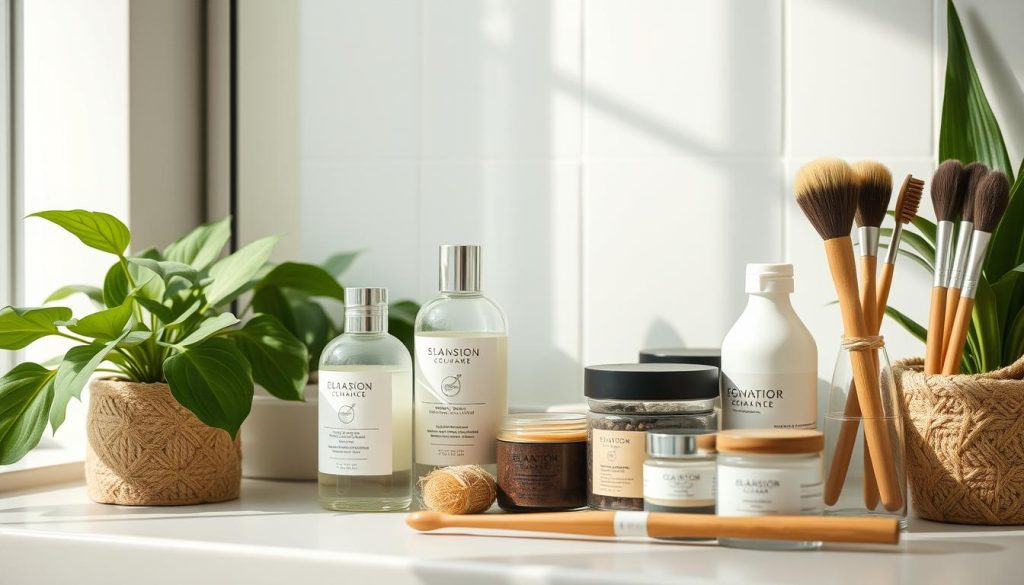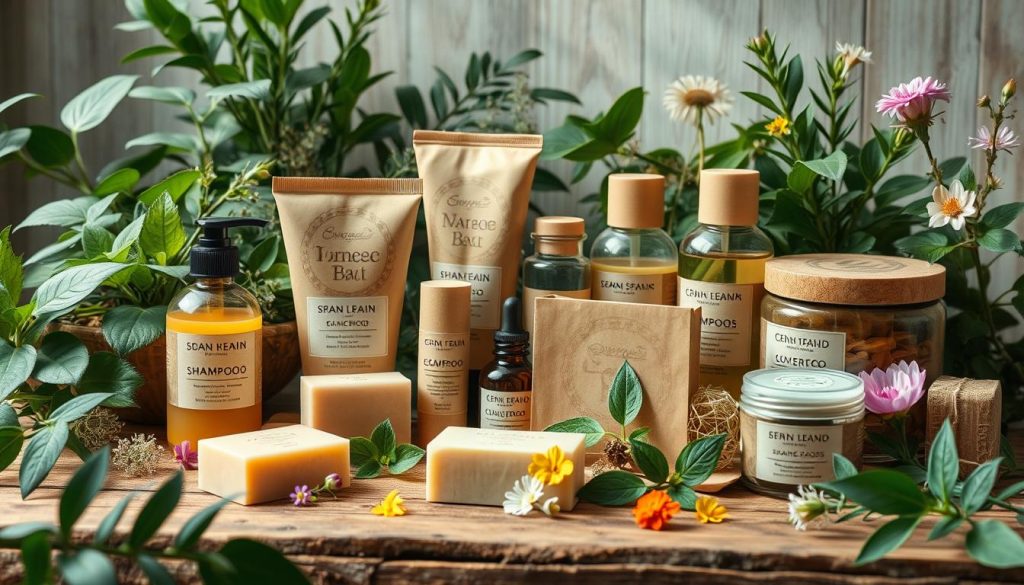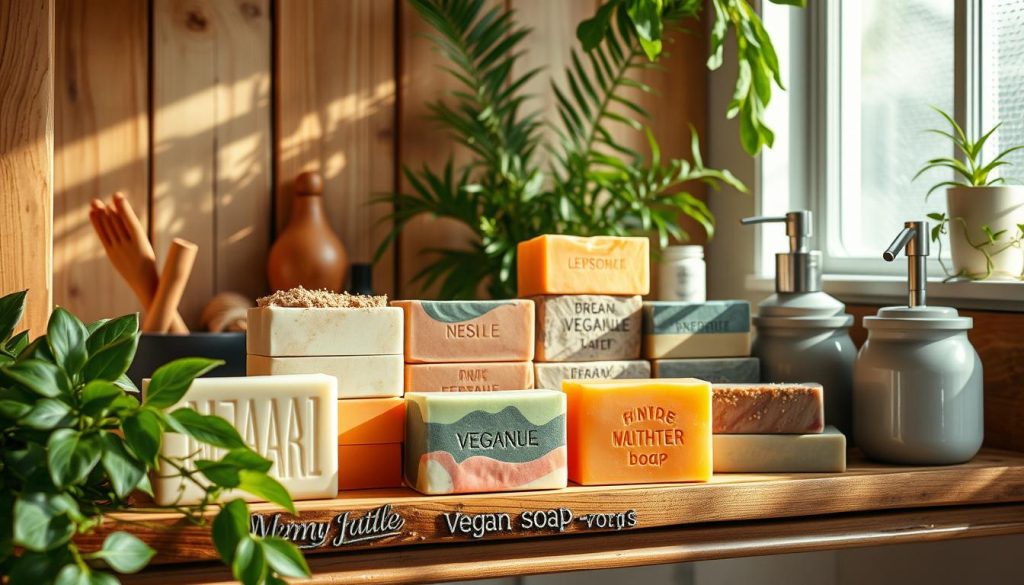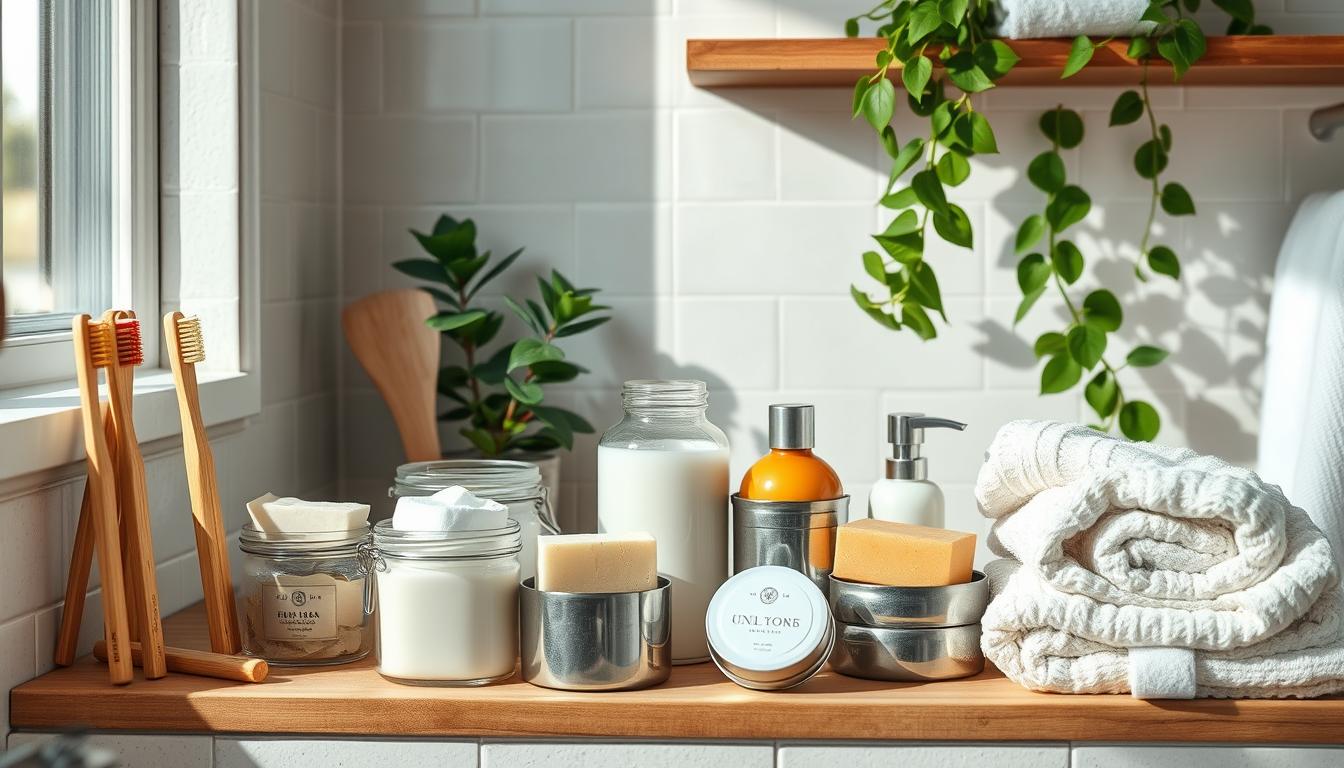I’m excited to share my journey into the world of plastic-free toiletries. As I’ve become more aware of the environmental impact of my daily routine, I’ve discovered a whole range of sustainable beauty products that are kinder to our planet.
In this guide, I’ll walk you through the benefits of switching to zero-waste personal care items. We’ll look at eco-friendly alternatives like shampoo bars and bamboo toothbrushes. These can turn your bathroom into a sustainable haven.
Join me as we explore plastic-free toiletries and how small changes can help our environment. Let’s make our bathroom routines more conscious together!
The Environmental Impact of Conventional Toiletries
I’ve been looking into eco-friendly cosmetics and biodegradable packaging. It’s shocking to see how much harm conventional toiletries cause. Let’s explore the harsh truth of our daily products.
Plastic Pollution in Oceans
Our oceans are filled with plastic. Toiletry bottles, wrappers, and tubes add to the 8 million tons of plastic in our seas every year. Sea creatures eat these, harming marine life badly.
Microplastics in Personal Care Products
Small plastic pieces, like in exfoliants and toothpastes, get into our water. They go through water treatment and end up in our waterways. This harms aquatic life and might even get into our food.
Carbon Footprint of Toiletry Production
Making conventional toiletries pollutes a lot. From getting raw materials to packaging and shipping, it all adds up. Choosing eco-friendly cosmetics and biodegradable packaging can lessen this harm.
| Product Type | Annual Plastic Waste (tons) | CO2 Emissions (kg/unit) |
|---|---|---|
| Shampoo Bottles | 80,000 | 0.15 |
| Toothpaste Tubes | 1.5 billion | 0.08 |
| Deodorant Containers | 15,000 | 0.21 |
These numbers show a dark picture. We must change our toiletry choices for a better future. Choosing eco-friendly cosmetics and biodegradable packaging can make a big difference.
Benefits of Switching to Plastic-Free Toiletries
Switching to plastic-free toiletries has opened up a world of benefits. It’s not just about reducing my environmental impact. It’s also about improving my health and well-being.
One big plus is the positive effect on our planet. Zero-waste personal care items cut down on plastic pollution. I feel proud knowing my daily routine doesn’t harm our oceans and landfills.
My health has also seen a boost. Plastic-free alternatives often use natural ingredients. This means healthier skin and hair, and fewer allergies for me.
Surprisingly, these sustainable products can save money too. Although they might cost more upfront, they last longer. This means I don’t need to buy them as often.
- Reduced environmental impact
- Improved personal health
- Potential cost savings
- Inspiration for others to adopt eco-friendly practices
Choosing zero-waste personal care makes me part of a bigger movement. It’s rewarding to see my choices inspire others to live more sustainably.
Essential Plastic-Free Toiletries for Your Eco-Friendly Bathroom
I’ve found some amazing plastic-free alternatives for my bathroom. These options not only cut down on waste but also work well. Let’s look at some key swaps you can make today.
Shampoo and Conditioner Bars
Refillable shampoo bars are a big win. They last longer than liquid shampoos and come in eco-friendly packaging. They make my hair feel clean and soft. Many brands also offer conditioner bars, making your hair care routine plastic-free.
Solid Soaps and Body Washes
Vegan soap bars are great for those who care about the planet. They’re made with natural stuff and have compostable packaging. They lather well and make my skin feel fresh. Some even work as shampoo bars, saving space in my shower.
Bamboo Toothbrushes and Natural Toothpaste
Choosing bamboo toothbrushes was a no-brainer. They’re biodegradable and just as good as plastic ones. Add natural toothpaste in glass jars or tablets, and you’ve got a plastic-free oral care routine.
Reusable Cotton Swabs and Rounds
Lastly, I replaced disposable cotton products with reusable ones. Washable cotton rounds are perfect for makeup removal, and silicone swabs replace single-use cotton buds. These small changes make a big difference in reducing waste over time.
| Product | Plastic Alternative | Benefits |
|---|---|---|
| Shampoo | Refillable shampoo bars | Long-lasting, plastic-free packaging |
| Soap | Vegan soap bars | Natural ingredients, compostable packaging |
| Toothbrush | Bamboo toothbrushes | Biodegradable, effective cleaning |
| Cotton Swabs | Reusable silicone swabs | Washable, reduces waste |
Sustainable Beauty Products: Makeup and Skincare

I’ve found that eco-friendly cosmetics and sustainable beauty products are changing the beauty world. They make us look good and help the planet. Let’s check out some cool options for a greener beauty routine.
Now, many brands offer makeup and skincare without plastic. They use glass jars, metal tins, and bamboo containers. These are recyclable or break down naturally, cutting down on landfill waste.
Natural and organic ingredients are big in sustainable beauty. Companies are swapping out bad chemicals for plant-based ones. This is good for our skin and the Earth.
Here’s a comparison of conventional vs. sustainable beauty products:
| Feature | Conventional Products | Sustainable Products |
|---|---|---|
| Packaging | Plastic containers | Glass, metal, or bamboo |
| Ingredients | Synthetic chemicals | Natural, organic compounds |
| Environmental Impact | High carbon footprint | Low carbon footprint |
| Cruelty-Free | Not always | Usually cruelty-free |
To start a plastic-free beauty routine, try these simple swaps:
- Switch to bar soap instead of liquid body wash
- Use a bamboo hairbrush
- Try reusable cotton pads for makeup removal
- Opt for lip balm in metal tins
Choosing eco-friendly cosmetics and sustainable beauty products lets us look great while helping the planet.
Zero-Waste Personal Care: Deodorants and Antiperspirants
I’m excited to share my journey into zero-waste personal care, focusing on natural deodorants. These products are game-changers for those seeking eco-friendly alternatives. Let’s explore some great options that keep you fresh without harming the planet.
Natural Deodorant Options
Natural deodorants are a key part of zero-waste personal care. They use ingredients like baking soda, coconut oil, and essential oils to fight odor. Many come in plastic-free packaging, reducing waste. I’ve found that crystal deodorants and deodorant creams work well for me.
DIY Deodorant Recipes
Making your own deodorant is fun and effective. Here’s a simple recipe I love:
- 1/4 cup coconut oil
- 1/4 cup arrowroot powder
- 1/4 cup baking soda
- 10 drops essential oil
Mix ingredients until smooth and store in a glass jar. Apply with fingers or a reusable applicator.
Refillable Deodorant Containers
Refillable containers are a great way to reduce waste. Many brands now offer sturdy containers you can refill with deodorant bars or creams. This approach combines the convenience of traditional deodorants with eco-friendly practices.
| Product Type | Pros | Cons |
|---|---|---|
| Natural Deodorant | Eco-friendly, natural ingredients | May need reapplication |
| DIY Deodorant | Customizable, cost-effective | Requires preparation time |
| Refillable Deodorant | Reduces plastic waste, convenient | Initial cost may be higher |
Switching to natural deodorants and zero-waste personal care products has been a positive change in my life. It’s a small step that makes a big difference for our planet.
Eco-Friendly Cosmetics: Packaging and Ingredients

I’ve seen a big change in the beauty world: eco-friendly cosmetics. These products focus on sustainable ingredients and packaging that breaks down easily. Let’s explore what makes them special.
Many brands now use plant-based ingredients. These are kinder to our skin and the planet. Aloe vera, jojoba oil, and shea butter are common. They moisturize well without harsh chemicals.
Biodegradable packaging is a big deal too. Brands are ditching plastic for bamboo, glass, and seaweed. These materials don’t harm the environment as much.
Here’s a quick look at some popular eco-friendly cosmetic brands and their sustainable initiatives:
| Brand | Packaging Innovation | Key Ingredients |
|---|---|---|
| Lush | Naked products (no packaging) | Essential oils, fresh fruits |
| Elate Cosmetics | Bamboo compacts | Organic botanicals |
| RMS Beauty | Glass containers | Coconut oil, herb extracts |
When I buy eco-friendly cosmetics, I check the ingredients and packaging. Look for USDA Organic or Ecocert certifications. They show the product meets high environmental standards.
Refillable Shampoo Bars: A Sustainable Hair Care Solution
I’ve found a hair care game-changer: refillable shampoo bars. They’re changing the way we wash our hair and cutting down on plastic waste.
Benefits of Shampoo Bars
Shampoo bars are better than bottled shampoos in many ways. They’re small, easy to take on trips, and last longer. They also come in packaging that’s free from plastic, which is great for those who care about the environment.
How to Use and Store Shampoo Bars
Using a shampoo bar is easy. Just wet your hair, rub the bar on your scalp, and wash as you normally would. To keep your bar fresh, store it in a dry place. A soap dish with holes for water is perfect.
Popular Shampoo Bar Brands
Many brands now make high-quality refillable shampoo bars. My favorites are Lush, Ethique, and HiBAR. They use natural ingredients and eco-friendly packaging, meeting the need for green beauty products.
Switching to refillable shampoo bars has cut my plastic use and made my hair shiny. It’s a small step towards a greener beauty routine.
Vegan Soap: Cruelty-Free Cleansing for Your Eco-Bathroom

Vegan soap is a big win for those who care about the planet. It’s made without animal products, which is great for those who don’t want to support animal cruelty. These soaps use plant oils, natural scents, and essential oils for a luxurious clean that’s also good for the earth.
Vegan soap is super versatile. It suits all skin types, from dry to oily. Brands like Ethique and Dr. Bronner’s make soaps that are as good as traditional ones but better for the planet. They often come in packaging that’s free from plastic, which is a big plus for your bathroom’s eco-friendliness.
When you’re picking out vegan soap, look for coconut oil, shea butter, and olive oil. These ingredients are good for your skin and don’t lose out on cleaning power. Brands like Lush, Ethique, and Dr. Bronner’s have lots of scents and types to choose from.
| Benefit | Vegan Soap | Traditional Soap |
|---|---|---|
| Cruelty-free | Yes | Not always |
| Eco-friendly packaging | Often plastic-free | Usually plastic |
| Skin-friendly ingredients | Natural, plant-based | May contain harsh chemicals |
| Biodegradability | High | Varies |
Choosing vegan soap is more than just taking care of your skin. It’s also a way to help the planet and support fair practices. Making this simple change can really help your bathroom become more eco-friendly.
Biodegradable Packaging: The Future of Toiletry Containers
I’m excited to explore the world of biodegradable packaging in the beauty industry. This new approach is changing how we think about beauty products. Let’s look at the materials, brands, and ways to dispose of them that are making this future eco-friendly.
Innovative Materials in Packaging
Biodegradable packaging is changing fast. Companies are using materials like mushroom mycelium, seaweed, and plant-based plastics. These materials break down naturally, leaving no harmful leftovers. Some brands even use packaging that grows plants when buried!
Brands Leading the Way in Sustainable Packaging
Several companies are leading the way with sustainable beauty products and packaging:
- Lush: Known for their “naked” products and compostable pots
- Ethique: Offers solid bars in compostable packaging
- Elate Cosmetics: Uses bamboo compacts and glass containers
- Seed Phytonutrients: Creates shower-friendly paper bottles
How to Properly Dispose of Biodegradable Packaging
To get the most out of biodegradable packaging, we need to dispose of it right:
- Check the label for specific disposal instructions
- Compost at home if the packaging is certified compostable
- Look for industrial composting facilities in your area
- If composting isn’t an option, recycle when possible
By choosing sustainable beauty products with biodegradable packaging, we can make a big difference. It’s a small change that can help us live more eco-friendly.
Making the Transition: Tips for Adopting Plastic-Free Toiletries
Ready to switch to plastic-free toiletries? I’ve got some tips to help you start your zero-waste journey. Begin by replacing one item at a time. This makes the change easier and lets you find what works best for you.
When you face challenges, remember why you began. Keep a note in your bathroom to remind you of your positive impact. It’s okay to make mistakes – what’s important is getting back on track. Try new products and don’t be afraid to find your favorites.
Make a checklist for your eco-friendly bathroom makeover. Include items like shampoo bars, natural deodorants, and bamboo toothbrushes. As you replace each item, cross it off your list. Seeing your progress can be very motivating. Remember, it’s about making progress, not being perfect, in your zero-waste routine.
Lastly, celebrate your successes, no matter how small. Every plastic bottle you avoid helps a lot over time. By choosing plastic-free toiletries, you’re not just changing your bathroom. You’re also helping make the planet cleaner and greener.
